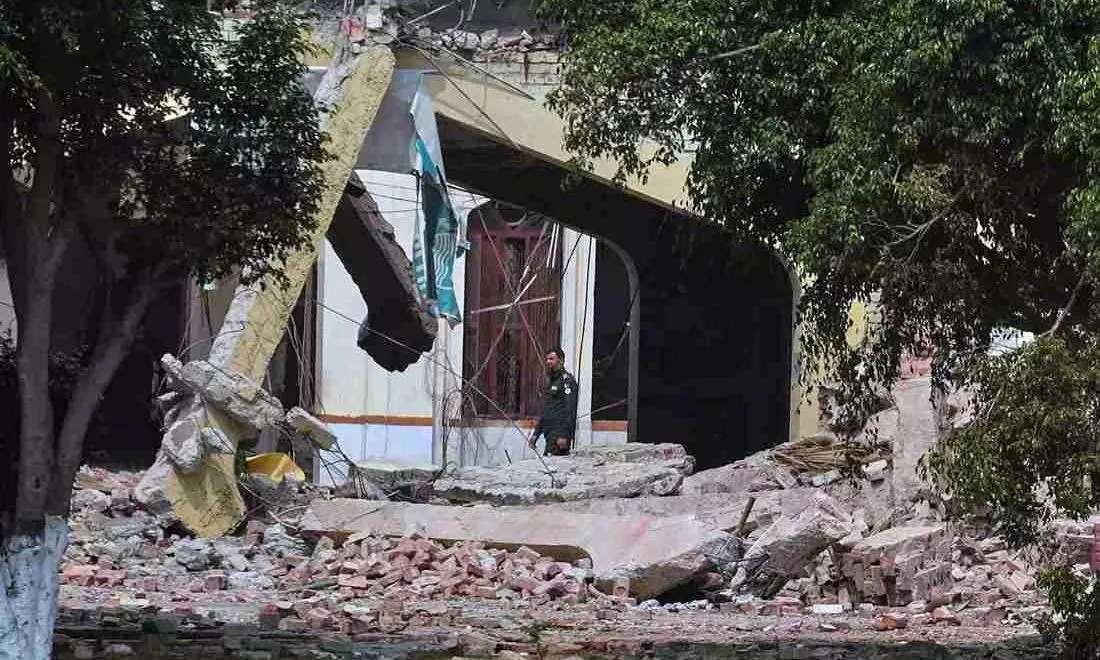
- Home
- India
- World
- Premium
- THE FEDERAL SPECIAL
- Analysis
- States
- Perspective
- Videos
- Sports
- Education
- Entertainment
- Elections
- Features
- Health
- Business
- Series
- In memoriam: Sheikh Mujibur Rahman
- Bishnoi's Men
- NEET TANGLE
- Economy Series
- Earth Day
- Kashmir’s Frozen Turbulence
- India@75
- The legend of Ramjanmabhoomi
- Liberalisation@30
- How to tame a dragon
- Celebrating biodiversity
- Farm Matters
- 50 days of solitude
- Bringing Migrants Home
- Budget 2020
- Jharkhand Votes
- The Federal Investigates
- The Federal Impact
- Vanishing Sand
- Gandhi @ 150
- Andhra Today
- Field report
- Operation Gulmarg
- Pandemic @1 Mn in India
- The Federal Year-End
- The Zero Year
- Science
- Brand studio
- Newsletter
- Elections 2024
- Events
- Home
- IndiaIndia
- World
- Analysis
- StatesStates
- PerspectivePerspective
- VideosVideos
- Sports
- Education
- Entertainment
- ElectionsElections
- Features
- Health
- BusinessBusiness
- Premium
- Loading...
Premium - Events

India cannot control what China does or constrain Pakistani state; however, it can influence Pakistani public opinion about India and credibility of their state
India has delivered humiliating punishment to Pakistan, firing missiles and other ordnance to destroy targets in Pakistan-Occupied Kashmir and Pakistani Punjab, in response to the terrorist killing of 26 tourists in Pahalgam on April 22.
India has maintained that it does not want to escalate further, although Pakistani attacks would be foiled. This is the right thing to do.
India has revoked the Indus Waters Treaty. India should make it clear that the intention is not to deprive the people of Pakistan of their share of the water from the rivers that flow west from the Himalayas — Jhelum, Chenab and Indus — but to renegotiate the treaty to make it fairer to Indian Punjab than the original treaty of 1960 had been.
Also Read: The World’s Big Three is invested in both India, Pak; that’s a silver lining
India’s main rival is China, not Pakistan
Many Indians are obsessed with the idea that Pakistan is India’s enemy. It would be more correct to say that the Pakistani state sees India as its enemy. India moved out of Pakistan’s league long ago. India’s principal rival is China. The rest of the world wants India to become powerful enough to countervail China.
China dislikes the idea of India as an Indo-Pacific power, leave alone as a global power. Beijing sees Pakistan as the instrumentality to translate their wish to contain India in the little league, even as China consolidates its position as the global rival to the United States.
Key technologies: China leads the world
China has been building its national power with focussed investment in industry, defence, and education at all levels, including basic research in every discipline of human knowledge, leading to new capability in key technologies.
The Australian Strategic Policy Institute tracks the development of 64 technologies, which it has identified as building strategic capability. China today leads the world in 57 of those key technologies.
Also Read: China will not like to see India-Pak tension over Pahalgam go out of control: Scholars
At present, those who rule Pakistan are willing to let their country serve as a force multiplier for China, harassing India as and when required, immobilising a section of our forces on the western front and preventing their redeployment to the north, and keeping India locked into what the world sees as a perpetual, regional rivalry.
Beijing’s hidden agenda
Beijing views with quiet satisfaction the jingoistic obsession of sections of Indian media, particularly social media, with wreaking havoc on Pakistan. The more the Indian public discourse is suffused with enmity towards Pakistan, the greater the pressure on the government to succumb to that sentiment. That works to Beijing’s advantage, and India’s strategic disadvantage.
Also Read: China extends ‘ironclad’ support to Pak amid tensions with India over Pahalgam attack
Does this mean that India should turn the other cheek to dastardly Pak-sponsored attacks such as the one at Pahalgam? Absolutely not. India should punish and discredit the Pakistani armed forces, as India has in the present context. India will chase the attackers and their backers to the ends of the earth, said Prime Minister Modi. And so we should.
Pakistani deep state
But who are the backers of the terrorists? The entire nation of Pakistan? Or is it the Pakistani deep state, which sees nuclear-armed Pakistan as the sword arm of Islam, which gains added strategic depth by the clever use of terror? The Pakistani deep state is frustrated to see few takers for its grandiloquent power projection even among Islamic countries.
Each of Iran, Saudi Arabia, and Turkiye sees itself as the foremost Islamic power and resents the fact that it is low-income, backward, misgoverned Pakistan, overtaken by Bangladesh in per capita income, that has the nuclear bomb, and not they.
Also Read: Pak initiates contingency plan to secure drugs after severing trade ties with India
The Pakistani army and its image as an invincible, nuclear-armed force and defender of the nation are key to the integrity of Pakistan as a nation-state. Pakistan rejects the no-first-use doctrine, and has nuclear-capable missiles and tactical nuclear weapons to counter India’s superiority.
China has supplied Pakistan with submarines capable of air-independent-propulsion, which can stay submerged longer, without having to come up for oxygen, to house nuclear missiles that give it second-strike capability, meaning, the capacity to strike back, even if an initial wave of attacks takes out known nuclear weapons in their silos.
Pakistani people: India’s potential allies
India cannot control what the Chinese government does. Nor can it directly constrain the Pakistani state. However, it can influence Pakistani public opinion about India and the credibility of the Pakistani state, including the military. The Pakistani state and its military derive their authority ultimately from the people of Pakistan.
India must neutralise Pakistan as China’s force multiplier. In this, the people of Pakistan are potential allies, through whom to constrain their army and the rest of the state machinery.
Also Read: India develops new-age tech to bring down drones, joins select group of nations
India’s punitive actions discredit the Pakistani armed forces in the eyes of the ordinary people. It is vital to feed this disenchantment with the armed forces and the deep state, and not create a situation in which the people rally behind the armed forces. That means de-escalation of hostilities and pre-empting the risk of generalised conflict.
India has chosen targets to minimise civilian casualties. This is most sensible. Sending Pakistanis visiting India for medical care packing was not particularly helpful. Talk of India using up all available water for itself in the west-flowing rivers is positively harmful.
Avoid sectarian politics, focus on economy
Sectarian politics in India, targeting Muslims, feeds into the narrative that legitimises the Pak state and its armed forces. Those who preach hatred towards Muslims in India effectively act as China’s agents who work to keep India grappling with Pakistan in the little league.
Also Read: 'Dance between elephant and dragon': China praises Modi's remarks on Sino-India ties
Both overt policy towards Pakistan and internal policy on inter-community relations must undermine the legitimacy of the Pakistani state/army. India must focus its energies on building its economic muscle and strategic capabilities keeping China in mind, rather than Pakistan.
(The Federal seeks to present views and opinions from all sides of the spectrum. The information, ideas, or opinions in the articles are of the author and do not necessarily reflect the views of The Federal.)


